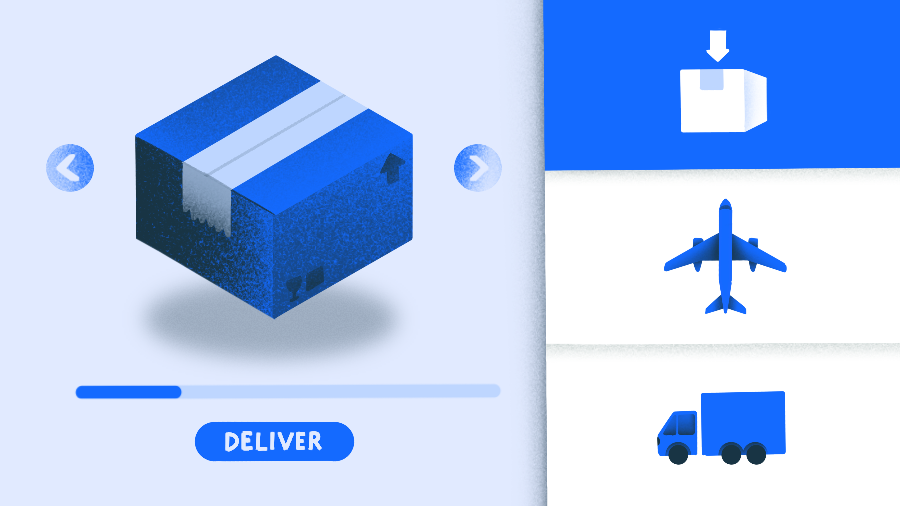As hundreds of flights in the Las Vegas area were canceled or severely delayed due to the pandemic in early April 2020, Airspace, a Carlsbad, California-based logistics company, needed to get indispensable health care shipments to a medical facility.
Subscribe to the Crunchbase Daily
“It was amazing what our algorithm did once it realized that all of those flights were canceled,” said Nick Bulcao, Airspace’s co-founder and CEO, in an interview with Crunchbase News.

Those algorithms, he said, figured out other markets to fly into and then matched drivers for the remainder of the route. Of the rerouted 50-plus shipments, the average delay on that day was only eight minutes, he said.
“I can’t say ‘on time,’ but pretty dang close to being on time on all of those shipments,” Bulcao said.
Airspace is one of a growing number of startups in the supply chain management sector, which has seen increased investor interest during a pandemic that upended the flow of goods around the world. At nearly $7 billion invested through July, venture funding to supply chain management companies in 2021 is on track to far exceed the previous industry peak in 2019 of $9.4 billion invested, Crunchbase data shows.

“COVID-19 has accelerated the need for improved connectedness between people, systems, and information, and these new solutions represent the next chapter of supply chain innovation,” said Quinn Li, global head of Qualcomm Ventures, via email, about the firm’s investment in supply chain companies.
We take a closer look at three of those companies in Qualcomm Ventures’ portfolio that have all raised funding in 2021 and are changing the way goods are delivered, tracked and prioritized.
When every minute counts
Airspace customers expect a delivery to either get there as fast as possible, or to be “time definite,” Bulcao said. In the latter case, that means “they want it there at 9 a.m. They don’t want it there before 9 a.m. They don’t want it there after 9 a.m. And they want the visibility of being able to see where that package is at all times.”
The company is upending an industry that was “literally pushing paper,” said Bulcao. Airspace is “taking that same transparency and everything that you get when you order a pair of socks on Amazon and being able to transition that to more important things, in my opinion, like human organs and airplane parts,” he said.
The company’s technology includes a geofence that notifies a customer when the delivery is in a 1-, 5- or 10-mile radius of its destination, depending on the client’s preference.
Airspace is able to solve the problem of finding the best route, thanks to advancements in artificial intelligence and machine learning, Bulcao said.
“We have a router that allows us to track thousands of different possible routes to be able to choose the perfect route for that particular shipment within a second, which nobody in the industry is even coming close to,” he said. “Then, on top of that, we have a machine-learning algorithm that allows us to choose the correct driver for that particular shipment. And it may not even be the driver that’s closest to that location—it may be the driver that knows that hospital they’re going into.”
By dividing deliveries up into the first, middle and final mile, Airspace has built its own direct relationship with independent contractors—akin to the model used by Uber and the like— for the first and final mile. In the middle, it partners with major commercial airlines, using excess capacity within airplanes to send anything within hours rather than the days it might take with FedEx or UPS.
“Computers can route and pick a driver way better than a human can. A human can provide better customer service, in my opinion,” said Bulcao. “So we’re not eliminating the human, we’re just putting them in positions where they can do their job at a higher level.”
Airspace makes a margin from each shipment, and has sent around 850,000 packages since 2016.
The company has about 200 enterprise customers using the platform daily for time-sensitive shipping needs. Its customer segments include the health care space, with clients like LabCorp, Quest Diagnostics, Southwest Transplant Alliance and American Red Cross. Frontier Airlines is one of its clients in the aerospace sector, which is particularly time-sensitive given that a grounded airplane can cost upwards of $100,000 per hour.
Including a $38 million Series C round earlier this year led by HarbourVest Partners and Telstra Ventures, Airspace has now raised more than $70 million in total funding. It has grown over 100 percent each year since being founded in 2016, and even more rapidly in the last year, according to the company. With more than 300 employees, it is currently opening offices in multiple European countries and has plans to expand to Asia and South America.
From last mile to last yard
As the pandemic unfolded, Locus, a Bangalore-based company that automates supply chain decisions, found its grocery clients hit with a huge increase in delivery volume. Overnight, its customers had to reconfigure their deliveries from specific time slots to an expanded time frame, as people were working from home.

“Traditionally, this would have been a quarter — or two quarters’ — long planning and deployment exercise,” said Nishith Rastogi, Locus’ co-founder and CEO.
But, under pandemic pressure, the company flipped the switch and made the change within 24 hours.
“For each of these companies, every day, there is new consumer demand, which is coming both overnight, as well as on the fly,” said Rastogi of Locus’ customers, which include BigBasket, an online grocery delivery company, and Croma, a retailer for heavy electronics like washing machines. It also works with pharmacy retailer 1mg. All three retailers are part of the Tata Group, operating across more than 200 cities across India.
“Our systems will map this demand of several hundred thousand consumers, in real-time as well as the overnight planning methodology,” Rastogi said.
There are many variables that the platform has to factor in for, say, 100 packages for its customers. How many trucks are needed? Should a customer use its own fleet or another distributor? What should it pay? How many packages should be added to each truck? What time does it need to be delivered? How can it factor time at the loading bay, traffic and any other ground incidents?
On top of that, the platform is continually calculating and reacting to changes throughout the day.
“We will help them select the right driver, with the right vehicle, to select the exact order, and deliver it in chronological order before and after the other consumer orders, to make sure that deliveries are happening in a cost-effective manner, in a predictable manner, and within the delivery service level agreement,” Rastogi said.
To do this, Locus taps into its order flow data, combined with transport data, to create the most optimal route.
Locus has raised a total of $78.8 million, per Crunchbase data, including a $50 million Series C in June 2021 led by Singapore-based GIC.
Rastogi believes the company can add the most value in short-haul shipping, which often accounts for 40 percent of the shipping cost of a long-haul item. Short haul also has the most variability in terms of options, he said.
Amazon’s impact
E-commerce giant Amazon has dramatically changed consumer expectations on delivery, according to Rastogi.
As a result, retail shopkeepers’ expectations also changed. Suddenly, those retailers started asking their distributors, “‘ If Amazon can deliver to me in 24 hours, why can’t you restock my shelves in 24 hours?’ ” he said.
The Amazon effect “made 24 hours replenishment the norm everywhere,” Rastogi said.
The one-day turnaround expectation also raised the bar for supply chain companies. “The moment you do that, the decisions that you need to make for that to happen are more complicated,” Rastogi said. “And instead of changing once every quarter, they are now changing every day. So that’s truly what led to the market demand for solutions like Locus. You need to optimize your everyday decisions, which are typically being taken manually, to a computational model.”
This is a new software category
FourKites, a Chicago-based supply chain visibility platform, tracks around 2 million packages a day—up from 1 million less than a year ago.
For “companies moving freight from anywhere to anywhere, we tell them exactly where the products are, at any given time,” said Mathew Elenjickal, its founder and CEO.
His company matches its customer package data with shipping tracking data and works with customers including Coca-Cola, Walmart Canada, 3M and Nestlé.

FourKites has raised more than $201.5 million in venture funding to date, including most recently a $100 million series D round in March led by private equity firm Thomas H. Lee Partners.
Due to government regulations, every truck in the U.S. has GPS connectivity, Elenjickal said. FourKites connects with the transportation GPS manufacturers, as well as satellite communications for ships and planes, connecting with more than 1,000 providers.
One of FourKites’ customers, 3M, had to massively ramp up production of face masks, gloves and other personal protective equipment, or PPE, during the pandemic. At the peak of the crisis, FourKites worked with the company to create a dashboard on PPE consumption across the U.S.
The pandemic also forced suppliers to figure out where existing inventory was sitting as they raced to address the change in buying patterns from in-store to e-commerce, Elenjickal said.
Lean inventory—also known as just-in-time inventory—was also upended as retailers wanted to stock up on goods to meet the changes in consumer demand.
Retailers also asked consumer packaged goods companies to share data on when items would arrive. “That collaboration across different companies through the platform is also something that accelerated during COVID,” Elenjickal said.
Investing in the connected supply chain
The imbalance of supply and demand was felt throughout the world during the pandemic, from temporary toilet paper and food shortages to shipping delays that wreaked havoc across entire industries. San Diego-based Qualcomm itself continues to feel the impact of a global computer chip shortfall that has in turn exacerbated shortfalls of cars, consumer electronics, clean energy equipment and thousands of other goods.
Li said Qualcomm Ventures aims to invest in startups that help solve these sorts of far-reaching problems.
“These companies are leaning into the power of a connected supply chain, leveraging everything from machine learning to predictive analytics to react to and anticipate unexpected events that have the potential to cause disruption,” he said.
Illustration: Dom Guzman

Stay up to date with recent funding rounds, acquisitions, and more with the Crunchbase Daily.










![Illustration of pandemic pet pampering. [Dom Guzman]](https://news.crunchbase.com/wp-content/uploads/2021/03/Pets-2-300x168.jpg)

67.1K Followers